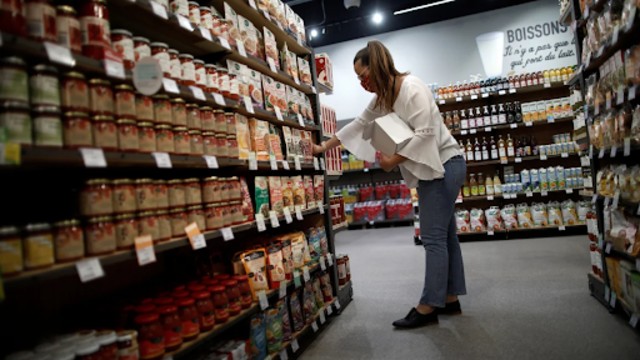
A worker refills shelves at a grocery store in Bretigny-sur-Orge, near Paris. REUTERS
The European Union is urging its citizens to keep at least three days’ worth of essential supplies, including food and water, in case of a crisis. This new guideline is part of a broader push by the EU Commission to strengthen the continent’s preparedness and resilience.
The EU released an 18-page document on Wednesday, highlighting the increasing threats Europe faces. The report points to growing geopolitical tensions, including the ongoing war in Ukraine, sabotage of vital infrastructure, and the dangers of electronic warfare. It stresses that citizens must be ready for unexpected disruptions.
European leaders have been warning about the need for better war readiness. Concerns over Russia’s aggressive actions have fueled the urgency. Additionally, strained relations with the United States, particularly under the Trump administration, have prompted the EU to focus on boosting its own defense capabilities.
The EU Commission's Preparedness Union Strategy outlines practical steps citizens should take. It recommends stocking up on enough food, water, and other supplies to last for at least 72 hours. The document emphasizes that during major disruptions, the first few days are the most critical for survival.
The strategy also calls for teaching "preparedness skills" in schools. The aim is to equip students with the knowledge to handle crises, including identifying false information. The EU sees misinformation as a growing threat during times of conflict or disaster.
European Commission President Ursula von der Leyen stressed the importance of proactive planning. “New realities require a new level of preparedness in Europe,” she said. She added that citizens, governments, and businesses need the right tools to prevent and quickly respond to crises.
Several EU nations have already been enhancing their emergency plans. Last year, Germany revised its national defense strategy. The updated plan gives clear instructions on how the country should respond if war breaks out in Europe. When introducing the plan, German Interior Minister Nancy Faeser said the move was necessary to strengthen Germany’s defense against Russian aggression.
The EU's new guidance serves as a wake-up call for citizens to take crisis preparedness seriously. By keeping essential supplies on hand and fostering resilience, the EU hopes its citizens will be better equipped to face unexpected emergencies.















